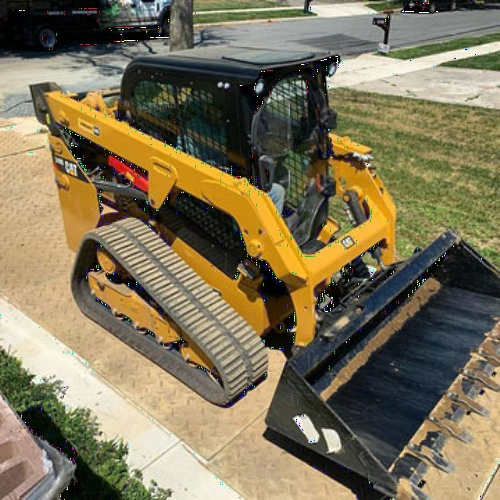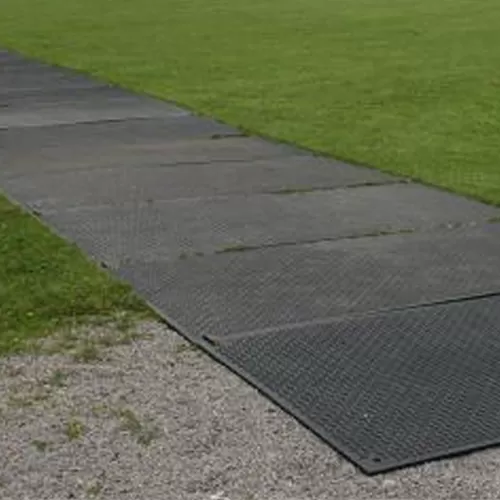Do Heavy Trucks Damage Or Crack Driveways?
Related Product: Gmats Ground Protection Mat 1/2 Inch x 4x8 Ft.
Will a Heavy Truck Crack My Driveway?
The answer to this question largely depends on how heavy the truck is. Asphalt and concrete driveways can be damaged by significant amounts of weight, so you will want to consider which vehicles will be driving and parking on the area.Your driveway can safely hold most personal vehicles, including most motor homes. You can safely park smaller trailers, dually pickups, and the typical vehicles that you can drive without special licensure.
As you start to get into construction vehicles, you can run into issues. Cement trucks, loaded dump trucks, and other heavy vehicles can cause divots, cracking, and other damage to your driveway.
The same is true of loaded trailers, like tractor trailer vehicles, front-end loaders, skid steers, dump trucks picking up dumpsters, and other equipment can also damage your pavement or blacktop, and even delivery vehicles holding heavy loads of stone or brick can cause damage.
That damage can be expensive to repair, and it can be difficult to restore your driveway’s original integrity and finish with a simple repair job. Repair costs will depend on the damage, as well as the type of driveway, whether that’s pavement, tar, or a resin-bound surface.
If the damage is significant, you may find that repaving your driveway is the only way to truly restore it. Fortunately, there are also many solutions if construction equipment needs to travel across your driveway to access your yard or home.
Protect Your Driveway
If a vehicle has to simply travel across your driveway, then using ground protection mats can help to prevent potential damage. These mats create a sort of temporary roadway for heavy machinery and vehicles, and you can even lay them directly on your driveway.
When using the mats, you will want to position them so that the smooth or less aggressively textured side is face-down on a hard, finished surface that can crack. The mat helps to distribute the machine’s weight across the driveway, keeping tires or tracks from digging down into the surface.
The mats are particularly helpful when a machine that uses tracks needs to travel across the driveway. They can prevent those tracks from gouging the surface, protecting your driveway.
Ground protection mats are easy to transport, thanks to the handholds that are built into each mat. You can even connect multiple mats together to create a continuous surface for vehicles.
Once the vehicles have traveled across your driveway, you can remove the mats. Many construction companies already have their own mats that they will bring to job sites with them, but purchasing your own set of mats is a great idea if you know you will be often having work done on your property.
Find Another Path
Depending on the layout of your property, it may be best to avoid having vehicles travel across your driveway at all. You might have a dirt or gravel access road that you can use, or you can give vehicles access across your lawn.
You can use ground protection mats to create a temporary road across your lawn. The mats prevent machinery from sinking down into the lawn, so you don’t have to worry about repairing divots after the vehicles have passed through.
If you will be installing ground protection mats over grass for a longer period of time, consider using the clear mat options. These mats are designed to allow the sun’s rays to still reach the grass, helping to keep it from dying while the mats are in place.
Limit Traffic
If you’re planning to have work done on your property, then start with an open conversation with the construction company that will be performing the work. Ask the company to come out to scout your property, which will include identifying an access route that is unimpaired by tree limbs or overhead wires.The company representative should be able to provide you with detailed information about each vehicle’s weight, as well as its potential for damaging your property. They should also be able to help you identify the best way to get the vehicles onto the property, and will identify structures like your leach field and well that you will need to work around.
If the weight of each vehicle is excessive and they need to travel across your driveway, ask if it’s possible to send a smaller vehicle and, if you’re receiving a delivery, check into breaking the delivery into multiple loads. You will pay greater transportation costs, so you will need to weigh whether those extra fees are still more affordable than repairing or repaving your driveway.
